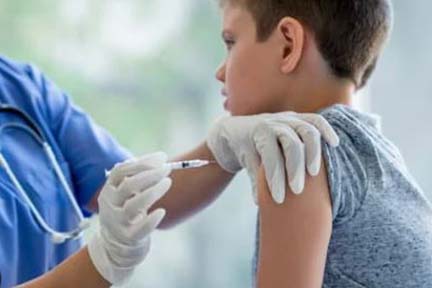
Health Division Extends Hours for Back-To-School Vaccinations
Health Division Extends Hours for Back-To-School Vaccinations
Pontiac, Mich. – Oakland County Health Division is offering extended clinic hours this week, Aug. 14-19, to provide school-age required vaccines. Walk-ins are welcome but appointments are encouraged. Visit www.oakgov.com/health or call 800-848-5533 to make an appointment.
“We strongly encourage children to get the necessary vaccinations before the school year begins,” said Leigh-Anne Stafford, Oakland County director of health and human services. “Vaccination is an important step to ensure health and protect classmates, friends, relatives, and others in the community from preventable diseases.”
School-age vaccines will be offered at the following dates, times and locations:
North Oakland Health Center at 1200 N. Telegraph Road, Building 34 East in Pontiac
- Tuesday, Aug. 15, 4 – 7 p.m.
- Thursday, Aug. 17, 4 – 7 p.m.
- Friday, Aug. 18, 8:30 – 11:30 a.m.
- Saturday, Aug. 19, 9 a.m. – 5 p.m.
South Oakland Health Center at 27725 Greenfield Road in Southfield
- Monday, Aug. 14, 4 – 7 p.m.
- Wednesday, Aug. 16, 4 – 7 p.m.
A parent or legal guardian must be present with a minor. The Health Division will continue to provide immunizations for all ages during normal business hours: Mondays, 8:30 a.m. – 6 p.m. and Tuesday – Friday, 8:30 a.m. – 5 p.m.
If you have insurance, check with your healthcare/insurance provider for possible benefit coverage. The Health Division participates in the Vaccines for Children (VFC) Program which offers vaccines at no cost for eligible children up to 18 years old. No one will be denied access to services due to inability to pay. A discounted/sliding fee schedule is available. Payment options include cash and credit card. Credit card fees apply. Bring all insurance and identification cards to the clinic.
Follow these recommendations to help protect children from serious diseases:
Check your child’s immunization records to determine what vaccines your child needs and catch up on any missed vaccines before the school year begins. Contact your child’s healthcare provider, school, or Oakland County Health Division for more information.
Follow the CDC’s Recommended Immunization Schedule, and work with your healthcare provider to determine what vaccines your child needs.
Get an annual flu shot: Annual flu vaccines are recommended for children 6 months and older. Each year, millions of children get sick from seasonal flu. Thousands are hospitalized and some children die from flu. Children of any age with chronic health problems like asthma, diabetes, and disorders of the brain or nervous system are at especially high risk of serious flu complications.
Get recommended vaccines for preteens in addition to a yearly flu vaccine:
- HPV vaccine protects against HPV infections that can cause cancer later in life.
- Tdap is a booster shot to help protect preteens from whooping cough, tetanus, and diphtheria.
- Meningococcal conjugate vaccine protects against meningitis, and bloodstream infections (bacteremia or septicemia). These illnesses can be very serious, even fatal.
For more information visit www.oakgov.com/health or contact Nurse on Call at 800-848-5533 or noc@oakgov.com. Nurse on Call is available 8:30 a.m. to 5 p.m., Monday through Friday. For up-to-date public health information, follow @publichealthOC on Facebook and X (formally known as Twitter).
For media inquiries only please contact Bill Mullan, Oakland County public information officer, at 248-858-1048.





 As anglers, swimmers and other water recreation fans flock to Michigan lakes and streams this summer, some may catch a glimpse of a common, though rarely seen invertebrate known as the freshwater jellyfish. Don’t be concerned though — these jellyfish are not harmful to humans and are believed to have negligible adverse effects on the aquatic environment.
As anglers, swimmers and other water recreation fans flock to Michigan lakes and streams this summer, some may catch a glimpse of a common, though rarely seen invertebrate known as the freshwater jellyfish. Don’t be concerned though — these jellyfish are not harmful to humans and are believed to have negligible adverse effects on the aquatic environment.

 The deadline to submit grant proposals for community tree planting projects for the 2023 DTE Energy Foundation partnership grant program has been extended to Aug. 18.
The deadline to submit grant proposals for community tree planting projects for the 2023 DTE Energy Foundation partnership grant program has been extended to Aug. 18.



